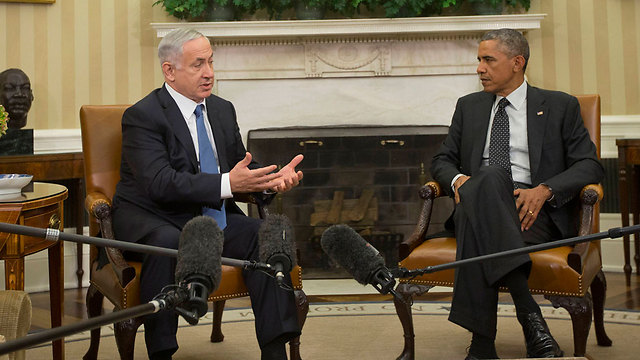
WASHINGTON - Prime Minister Benjamin Netanyahu will be invited to the White House in early November, Spokesman Josh Earnest said on Friday.
The annual conference of the Jewish Federations of North America will begin on November 8, and it is likely that the White House intends the visit to coincide with the event.
Earnest said that while the two leaders have disagreements, their relationship regarding defense was stable, and both were committed to strengthening relations.
Obama pointedly refused to see Netanyahu in March when the Israeli leader appeared before a joint meeting of Congress and harshly criticized a US-negotiated nuclear deal with Iran, Israel's enemy. Lawmakers had arranged Netanyahu's appearance without White House input.
Friday's announcement of a possible visit came soon after the US House of Representatives defeated a resolution backing the nuclear agreement with Iran in a symbolic vote engineered by congressional Republicans who object to the deal.
House members defeated the measure 269 to 162 in a strongly partisan vote, part of an effort by Republicans to underscore their objections to the international accord despite a vote on Thursday in the Senate that blocked a Republican-led effort to kill it by passing a resolution of disapproval.
"This deal is far worse than anything I could have imagined," John Boehner, the Republican Speaker of the House, said in a speech harshly critical of the July 14 agreement between the United States, five other world powers and Iran.
Twenty-five Democrats joined 244 Republicans in voting against the resolution. No Republicans voted in favor.
After a rebellion by some of the most conservative Republicans, party leaders abandoned plans for a House vote on a disapproval resolution, opting for votes on three measures to send a stronger message that a majority of Congress objects to the pact.
Members from each party accuse the other of using the dispute for political purposes.
Democrats have accused Republicans of leaping to reject the deal and ignoring US allies and international experts who back it. Some also accused Republicans of politicizing the anniversary of the Sept. 11, 2001, attacks by holding the votes on that date.
In turn, Republicans accuse Democrats of blindly supporting Democratic President Barack Obama in an agreement they see as going too far in easing economic sanctions on Iran in return for too few concessions on its nuclear program.
They also joined with Israeli Prime Minister Benjamin Netanyahu, who lobbied against the deal, in calling it a threat to his country's existence.
An Israeli diplomatic source who could not be named said Israel was pleased with the outcome of the House votes.
Boehner and other Republican congressional leaders are considering more options, including suing Obama, to stop the deal.
A disapproval resolution would have derailed the pact by eliminating Obama's ability to waive many US sanctions on Tehran. The three measures considered by the House would have no similar impact on the agreement.
In a second vote on Friday, the House voted 247 to 186 to pass legislation that would bar Obama from waiving, suspending or reducing sanctions under the nuclear agreement.
That vote was even more strongly partisan. Two Democrats joined 245 Republicans in voting yes, while all 186 "no's" were from Democrats.
To become law, that legislation would have to be passed in the Senate and then survive a likely veto.
There are no plans now for the Senate to vote on the House measures.

















